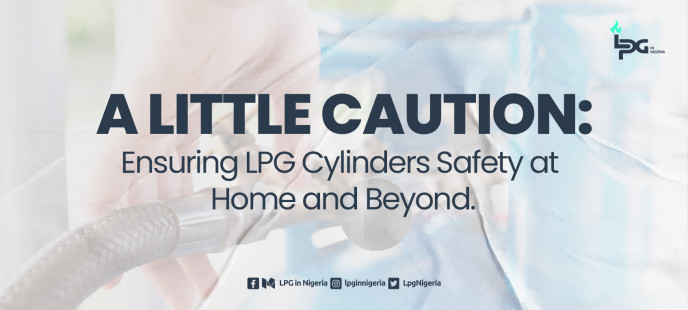- 3730
- 2
Sharing Ideas and Updates on LPG in Nigeria and related information to enable effective collaboration within the LPG Value Chain
A Little Caution: Ensuring LPG Cylinders Safety At Home And Beyond

The demand for Liquefied Petroleum Gas (LPG) continues to rise as households, restaurants, laboratories, and industrial facilities embrace it as a cleaner, more efficient energy source. However, the risks associated with LPG cylinders—especially expired or poorly maintained ones—underscore the need for vigilance. A little caution can indeed go a long way in protecting lives and property.
This blog outlines key safety measures, expert advice, and best practices to prevent gas cylinder damage and explosions.
The Importance of Cylinder Maintenance and Requalification
Gas cylinders are designed to contain high-pressure gases safely, but improper handling or maintenance can lead to catastrophic consequences, including leaks, ruptures, or explosions. Regular maintenance, known as requalification, is essential to ensure cylinders remain safe throughout their lifespan.
According to industry experts, requalification should occur every five years, with a maximum lifespan of 15 years. After this, cylinders should be retired and safely removed from circulation. As Bassey Essien, a former Executive Secretary of the Nigerian Association of Liquefied Petroleum Gas, explains:
“When a cylinder expires, its strength reduces, and anything can happen to it afterward.”
We wrote extensively on this in our prior blog post, you can go read it.
Common Causes of Gas Cylinder Explosions
Expired or Faulty Cylinders
Expired cylinders are structurally weaker and more prone to leaks or ruptures. Faulty valves or damaged safety mechanisms can also lead to uncontrolled gas release. Regular inspections and adherence to requalification schedules can mitigate these risks.
Gas Leaks
Essien advises that both cylinder and valve leaks require immediate attention. Even small issues, such as a weakened valve rubber, can lead to dangerous gas leaks. Applying soapy water to the cylinder can help detect leaks—bubbles indicate areas that need repair or replacement.
Improper Storage and Handling
Storing cylinders near heat sources, exposing them to direct sunlight, or mishandling them through bumps and drops can compromise their integrity. Proper storage in a well-ventilated, cool, and dry area is crucial.
Key Safety Guidelines for LPG Cylinder Use
Avoid Using Fabricated Cylinders
Using substandard, fabricated cylinders is a significant safety risk. In Nigeria, some welders create cylinders from low-quality metals, which cannot withstand the required pressure.
“People should discard damaged cylinders or consult certified welders from the Department of Petroleum Resources for repairs,” Essien advises.
Use Compatible Equipment
Always use regulators, hoses, and fittings that match the cylinder’s specifications. This ensures proper pressure regulation and reduces the risk of leaks.
Desist from Overfilling Cylinders
Over-pressurising a cylinder by exceeding its rated capacity can lead to ruptures. For example, a 6kg cylinder should be filled with no more than 5kg to 5.5kg of gas to ensure safe usage.
Check Connections Regularly
Faulty connections between cylinders and appliances are a common source of gas leaks. Always ensure connections are secure and that fittings are in good condition.
Practice Safe Ignition
Never open the gas flow before igniting a burner. As Felix Ekundayo, Chairman of the Safety and Technical Committee of the Nigeria Liquefied and Compressed Gases Association, warns:
“Opening the gas flow before lighting a spark can lead to an uncontrolled fire or explosion.”
Handling Gas Leaks at Home
If you suspect a gas leak:
Turn off the cylinder valve immediately.
Open windows to ventilate the area.
Avoid using electrical appliances, lights, matches, or lighters.
Check for leaks using soapy water.
Seek professional assistance to address the issue.
SuperGas, a leading LPG company, advises users to turn off the gas supply at the cylinder valve even when not in use for short periods.
Avoid Heat and Electrical Hazards
Keep cylinders away from open flames, stoves, and electrical appliances. Tech experts have also warned against making calls in the kitchen while cooking, as electrical devices can spark and ignite leaked gas.
A Final Word on LPG Safety
The consequences of gas cylinder explosions are devastating, leading to injuries, loss of life, and property damage. To prevent such disasters, consumers must adhere to safety guidelines, perform regular inspections, and replace expired or faulty cylinders.
As Dr. Joseph Odumodu, a former Director-General of the Standards Organisation of Nigeria, noted:
“Every cylinder must go through requalification every five years. That also provides for a 15-year life cycle.”
By incorporating these safety measures into daily routines, we can minimize risks and create a safer environment for all. Always prioritize safety—it could save lives.
We have given you back-to-back information on LPG cylinder safety for the past week and trust that the information will guide your decisions when handling yours.
Comment below, as I love to hear from you.
SHARE TOO!!
















Collins Chibuike
20 January 2025 - 07:39amThanks for your tips ,I appreciate greatly
Reply